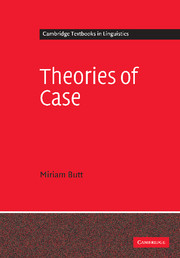8 - More Theories Great and Small
Published online by Cambridge University Press: 05 June 2012
Summary
Die flektierende Deklination ist in den Sprachen des romanisch-germanischen Westens bloß durch unbedeutende Relikte vertreten.
‘The inflectional declination of the Romance-Germanic languages of the West is represented only by insignificant relics.’
[Roman Jakobson, 1936, Beitrag zur allgemeinen Kasuslehre, p.242]This chapter wraps up the book by discussing some approaches that have not been mentioned as yet. The first half of the chapter introduces Role and Reference Grammar, which is a well articulated theory of syntax with a detailed theory of linking. The second part of the chapter surveys a recent development in syntactic theory, namely the introduction of Optimality Theory.
Role and Reference Grammar
Like RG and LFG, Role and Reference Grammar (RRG) originated in the 1970s. The founder of the theory, Robert Van Valin, asked himself whether an approach that based itself on core data from Lakhota, Tagalog and Dyirbal, rather than on data from Western European languages (and Hebrew) would differ substantially from the standard Chomskyan derivational/transformational tradition (Foley and Van Valin 1977, Van Valin 1977a, b). The answer to his question is ‘yes’, as the subsequent development of RRG has shown. RRG today is a theory with many active practitioners, international conferences, and summer schools. Much of the data that is analysed is the result of primary field work. As such, there are several languages for which only RRG analyses exist. Comprehensive discussions of the theory are presented in Van Valin (1993) and Van Valin and LaPolla (1997).
- Type
- Chapter
- Information
- Theories of Case , pp. 202 - 227Publisher: Cambridge University PressPrint publication year: 2006



